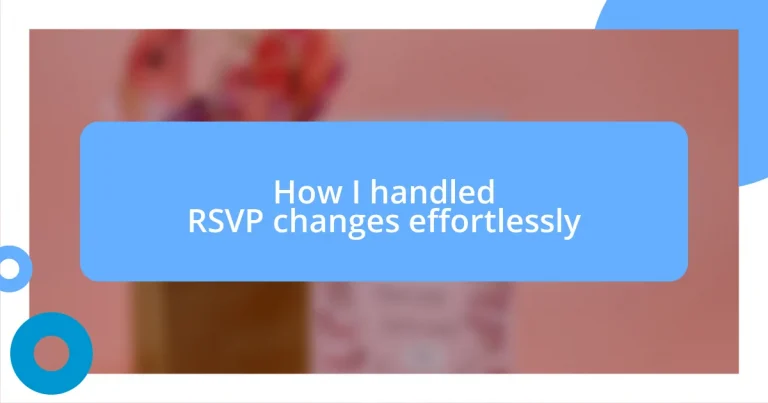Key takeaways:
- Open communication about RSVP changes fosters better relationships and reduces anxiety for hosts and guests alike.
- Utilizing flexible guest lists and RSVP management tools helps streamline event planning and accommodate unexpected changes.
- Establishing backup plans and learning from past experiences enhances adaptability, turning potential disappointments into positive outcomes.
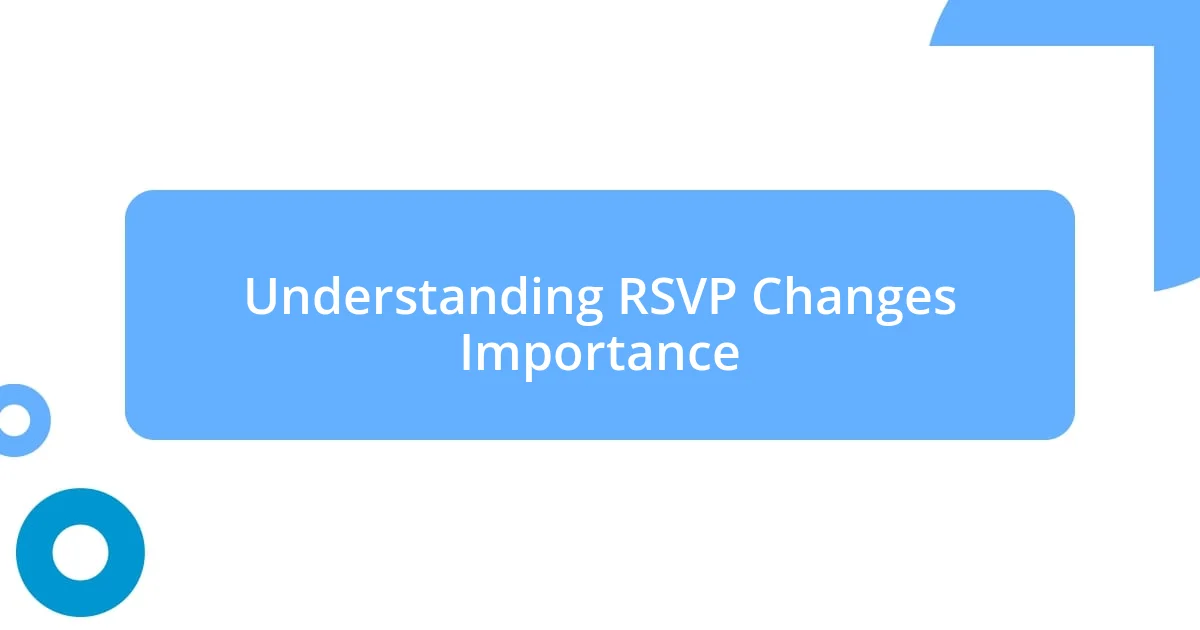
Understanding RSVP Changes Importance
Understanding the importance of RSVP changes goes beyond mere etiquette; it reflects respect for everyone’s time and effort. I recall a time when I had to change my RSVP for a friend’s wedding unexpectedly. The moment I informed her, I felt a wave of guilt wash over me, but ultimately, it turned out to be a relief because she truly appreciated my honesty.
When I think about RSVP changes, I often wonder: what would happen if everyone communicated their changes openly? In my experience, clear communication helps reinforce relationships. It not only mitigates any anxiety for the host but also creates an environment where every guest feels valued, regardless of the circumstances that affect their attendance.
Additionally, RSVP changes allow for better planning. I’ve been in situations where an accurate headcount transformed a gathering from chaotic to enjoyable. When guests keep their hosts informed, it not only shows consideration but also contributes to a more cohesive and memorable event for all involved. Isn’t it interesting how just a little communication can foster such positive outcomes?
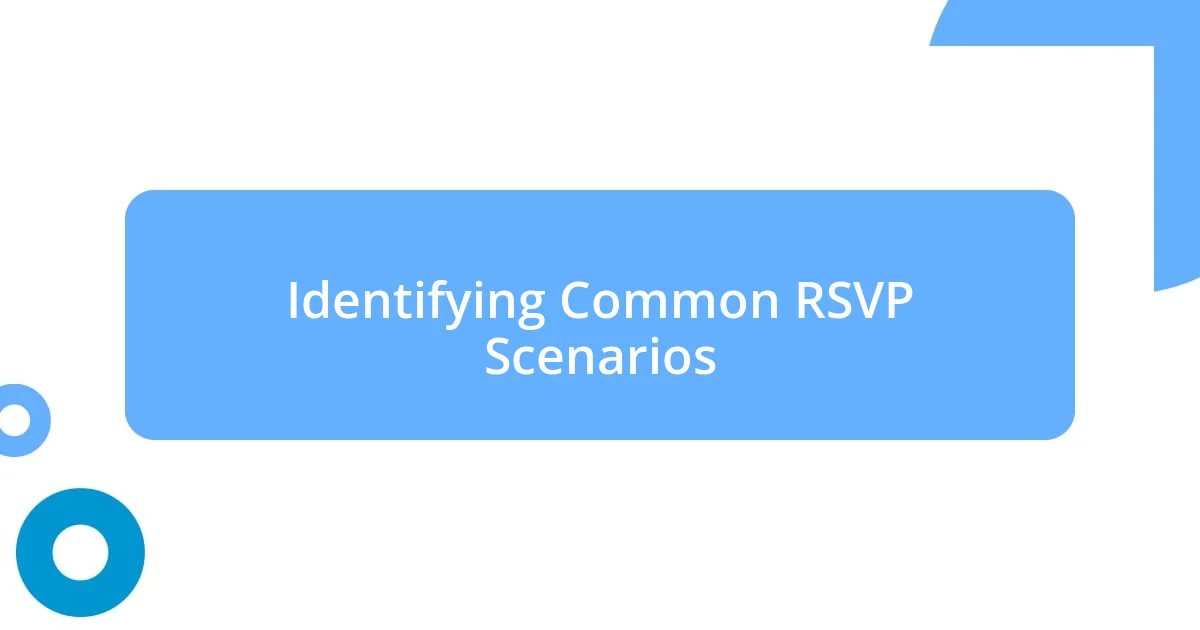
Identifying Common RSVP Scenarios
Identifying common RSVP scenarios can really shed light on why flexibility is essential for a smooth event. I’ve encountered various situations where changes became necessary—like when a last-minute work commitment clashed with a friend’s birthday party. It shows how life can throw curveballs, and being aware of these types of scenarios is crucial.
Here are some common scenarios I’ve identified:
- Unexpected Illness: A guest feels unwell and must cancel their attendance.
- Travel Conflicts: Flights get delayed, or weather conditions change unexpectedly.
- Family Emergencies: A sudden crisis arises that takes precedence over the event.
- Work Obligations: A last-minute meeting or project deadline interferes with planned attendance.
- Change of Heart: Sometimes, guests simply feel overwhelmed or stressed and opt out despite prior intentions.
Reflecting on these experiences, I realize that being proactive in these situations can greatly alleviate the stress that often comes with managing an RSVP list. There’s something comforting about knowing we’re all navigating similar challenges.
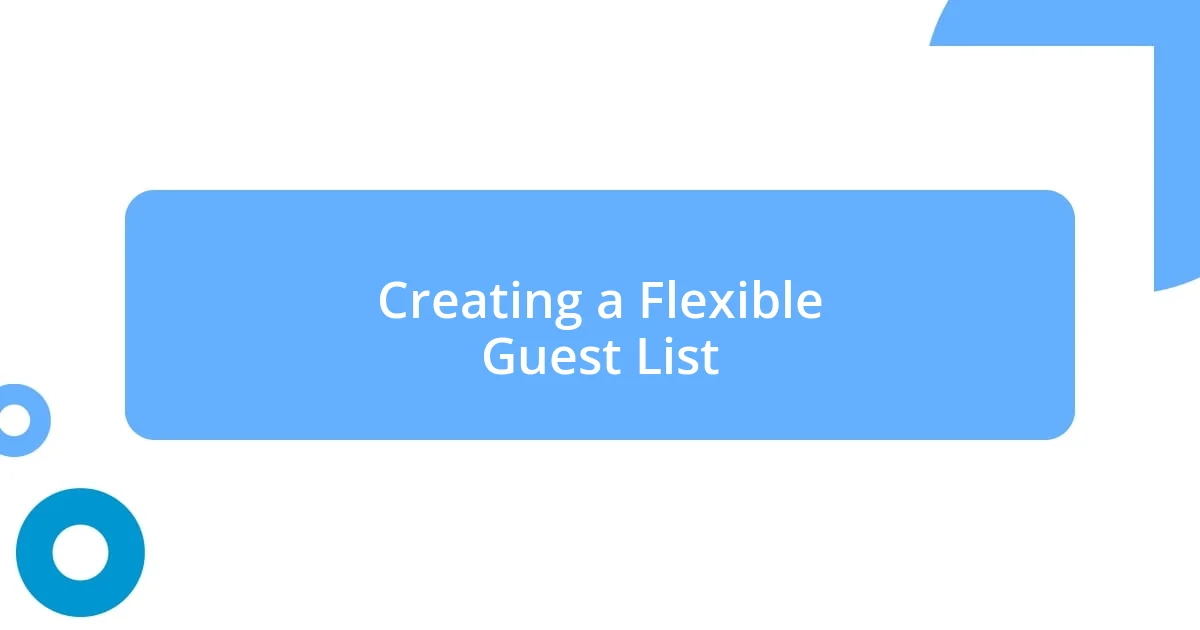
Creating a Flexible Guest List
Creating a flexible guest list can transform the way we plan events. I’ve learned that having a list that adapts to changes not only smooths out potential bumps, but also reflects my understanding of life’s unpredictability. For instance, during my sister’s engagement party, I created a guest list using a shared Google Doc. This allowed everyone to add or adjust their attendance as needed, and it felt great to see people engage with the planning process openly.
Another approach I’ve embraced is to categorize guests by their likelihood of attending, which includes “maybes.” This way, I can create a dynamic list that remains manageable. When I organized a charity dinner, I included guests who were uncertain on the list, and it turned out one of them surprised us by coming! It reminded me that flexibility isn’t just a strategy; it can lead to delightful surprises.
Finally, I’ve found that using RSVP tools that allow for easy updates has made a huge difference. For a milestone birthday, I implemented a system that let guests change their responses with a click. As I watched the list evolve in real-time, it gave me peace of mind and fostered an atmosphere of open communication, reassuring everyone that their plans were not set in stone.
| Guest List Type | Benefits |
|---|---|
| Traditional Guest List | Less flexibility; harder to manage changes. |
| Dynamic Online Guest List | Allows real-time updates; encourages guest interaction. |
| Segmented Guest List | Helps prioritize attendees; better management of resources. |
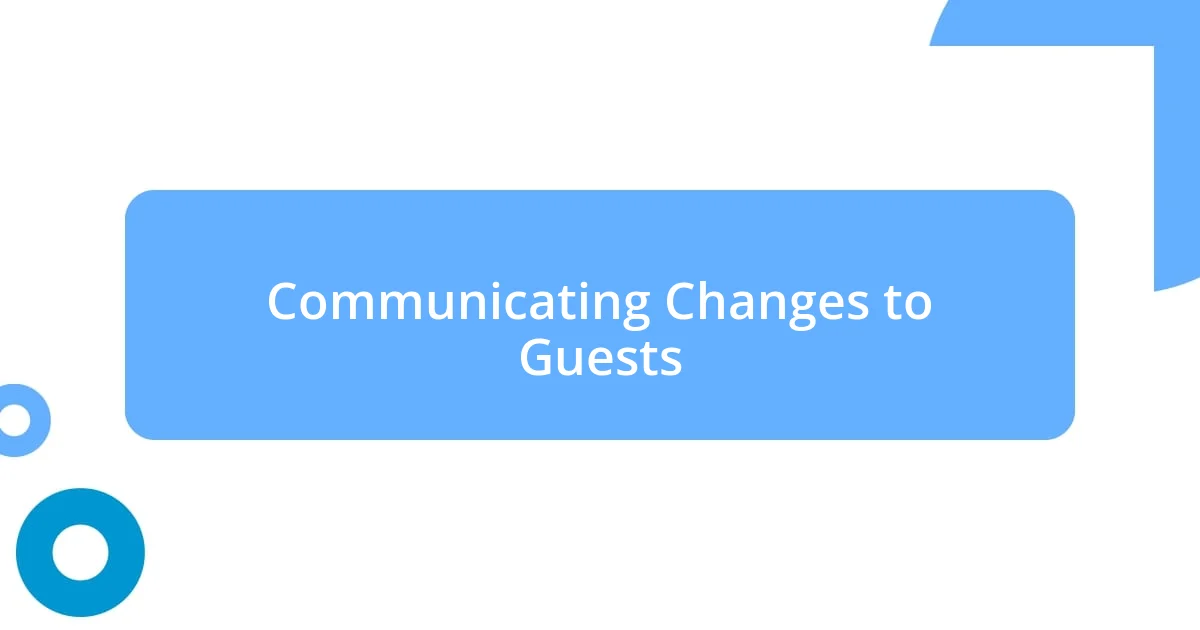
Communicating Changes to Guests
Communicating changes to guests can sometimes feel daunting, but I’ve found that honesty and clarity go a long way. When I had to adjust the time for a close friend’s wedding due to weather concerns, I simply sent out a text update. The response was overwhelmingly positive—everyone appreciated being kept in the loop, and it reinforced my belief that transparency builds trust among guests.
Another method I’ve adopted is utilizing social media for quick updates. A few years back, I had to change the location of a family reunion last minute. By posting the new details on our family group chat, everyone instantly had access to the information. It felt great to see family members responding in real-time, adjusting their plans, and reassuring each other that we would still have a wonderful time together.
Sometimes, I wonder how much stress I could have avoided if I had been more proactive in communicating changes. After a holiday gathering last year, I realized that sending a friendly reminder about potential changes ahead of time really helped ease guests’ anxiety. It’s all about fostering an environment where guests feel valued and informed, turning what could be complicated adjustments into a more effortless experience for everyone involved.
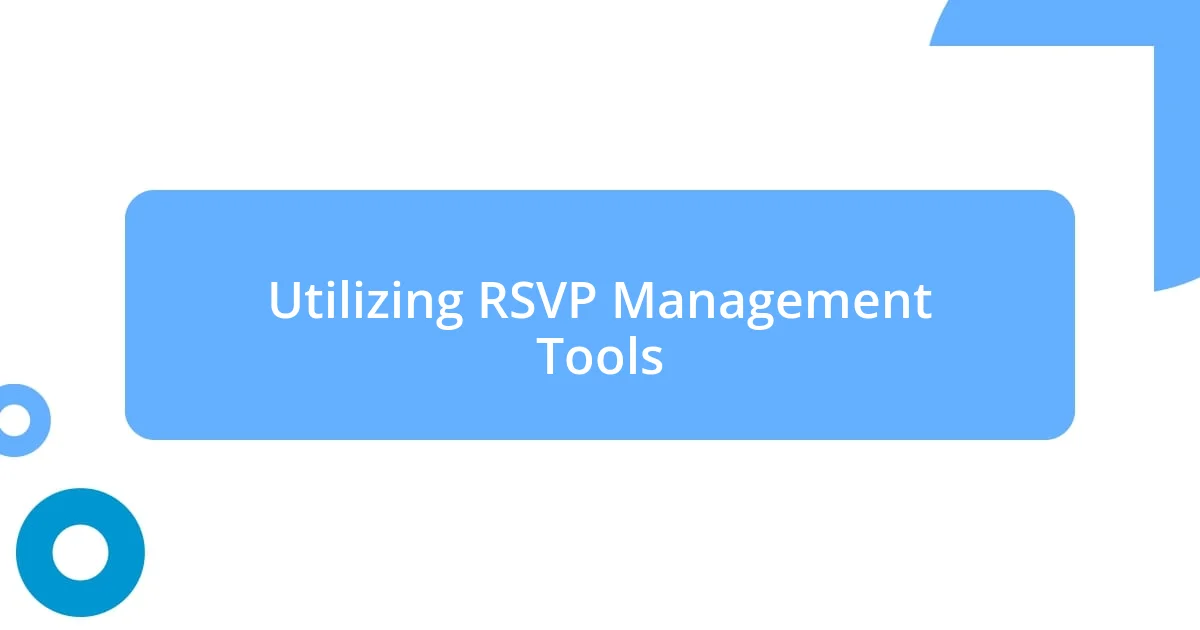
Utilizing RSVP Management Tools
Utilizing RSVP management tools has genuinely revolutionized how I handle my event planning. For instance, when I kicked off preparations for a holiday get-together, I discovered the convenience of platforms like Eventbrite. Setting up a dedicated page allowed guests to respond and edit their RSVPs with ease. I felt a sense of relief watching attendees effortlessly adjust their plans without overwhelming my inbox.
During my last book club gathering, I experimented with an app designed specifically for managing RSVPs. I loved how it sent reminders to guests automatically, which took a load off my shoulders. As responses rolled in, I couldn’t help but marvel at how technology not only streamlined the process but also created a shared anticipation for our meeting. It really engaged the group, enhancing our connection even before we sat down together.
Sometimes I ask myself how I ever managed without these tools. Reflecting on my first few attempts at organizing events, I remember the chaos of tracking responses with scattered emails. The relief I felt when shifting to a centralized system was astonishing. Now, when RSVP changes occur, I can address them proactively, keeping the momentum alive. It’s like having a personal assistant at my fingertips, ensuring that everyone feels included and informed.
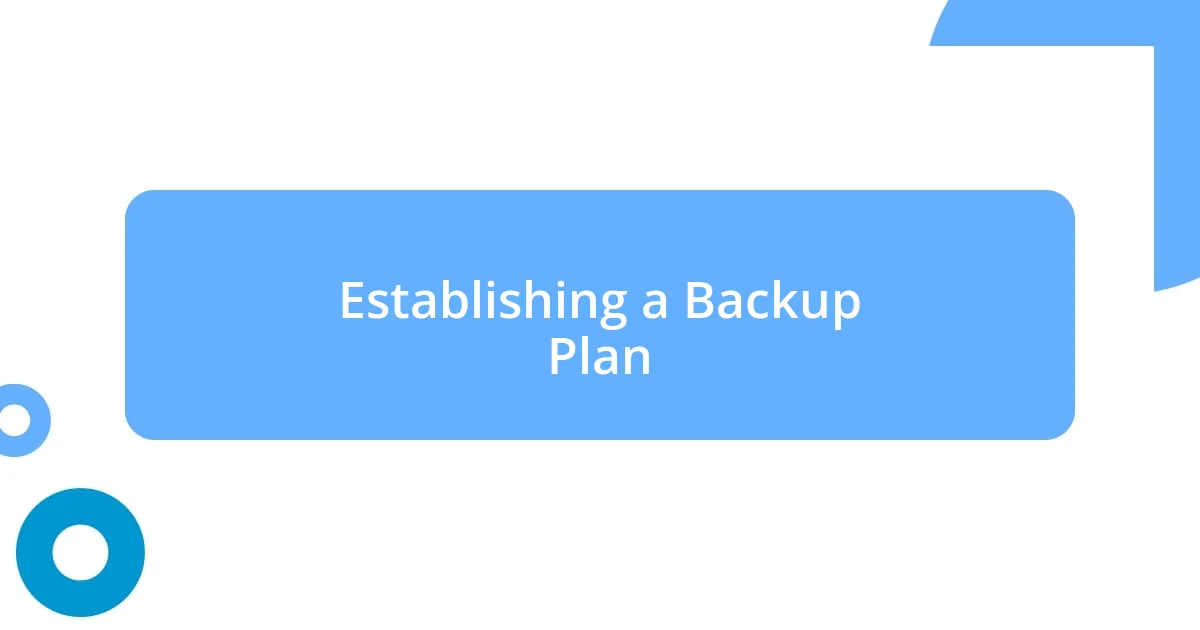
Establishing a Backup Plan
Establishing a backup plan is essential to ensuring a smooth event experience. There was a time when my best friend’s birthday party faced an unexpected snowstorm. I quickly devised a backup plan involving an alternative indoor venue and a virtual option for those who couldn’t make it. It amazed me how much stress melted away the moment I had a contingency in place.
I’ve learned that thinking ahead can truly save the day. After a personal experience with an outdoor wedding being rained out, I recognized the importance of a rain plan. We secured a nearby hall, and it turned out to be a hit! The flexibility turned a potentially disappointing scenario into one filled with laughter and joy, a reminder that sometimes the best moments come from unexpected shifts.
What I also find helpful is sharing these backup plans with the guests upfront. I remember when I hosted a summer picnic; I included a note in the invites outlining what we’d do if the weather didn’t cooperate. This foresight not only set everyone’s minds at ease but also sparked discussions about the alternatives, creating excitement about the day itself. Isn’t that a great way to build community, even before the event starts?
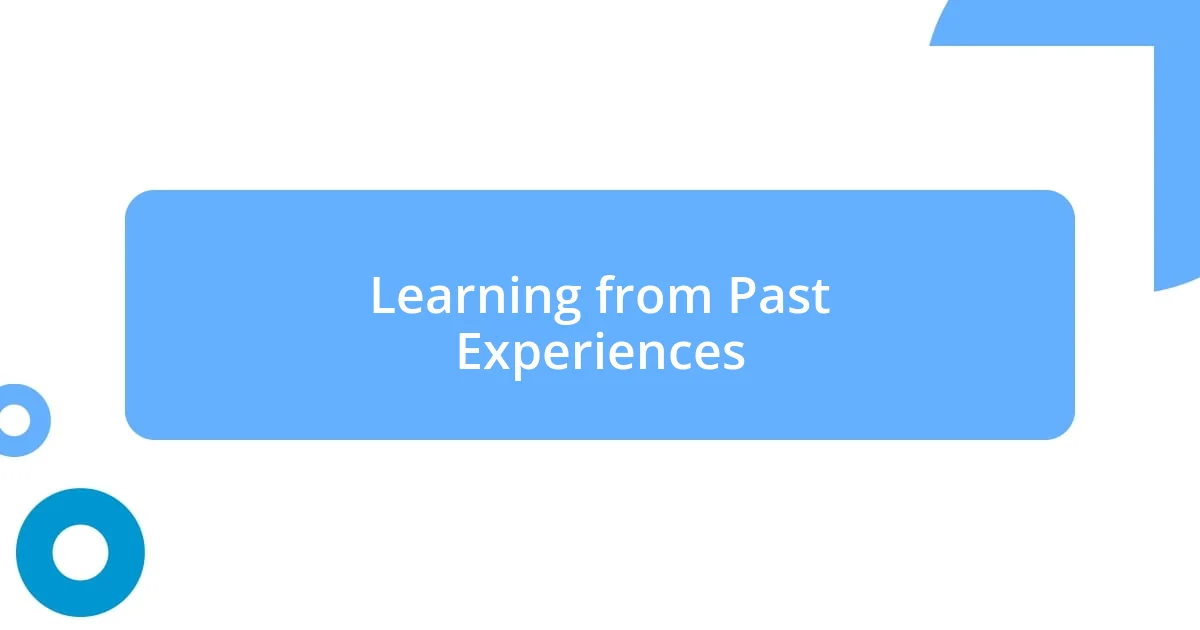
Learning from Past Experiences
I remember my first few RSVP experiences were far from seamless. There was this one time I hosted an engagement party, and tracking who was coming felt like a daunting task. After months of planning, I ended up getting anxious when half my guest list hadn’t responded until just a few days before the event. It was a learning moment; I vowed never to let that chaos repeat itself. Since then, I’ve made it a point to anticipate those last-minute changes and keep communication channels open, making the entire process smoother.
Reflecting on how I managed RSVP changes really highlights my growth as an event planner. The awkwardness of receiving a call from a close friend saying they couldn’t make it last minute certainly stung. But it pushed me to develop a more empathetic approach. Now, I ensure that guests know it’s absolutely okay to change their plans. I’ve noticed how that simple acknowledgment makes them feel valued and considered, which, in turn, enriches our relationships.
Every RSVP situation has become a mini-lesson in flexibility for me. I realized that when I initially took things personally, it led to disappointment. Now, I embrace the ebb and flow of guest participation with a light heart. For example, during my last dinner party, one friend dropped out due to a work commitment, but instead of feeling disheartened, I filled that spot with another friend who was excited to join. It turned into a delightful evening of unexpected connections, which reinforced the idea that change can often lead to something wonderful. How about you – have you found unexpected joys in RSVP changes?












